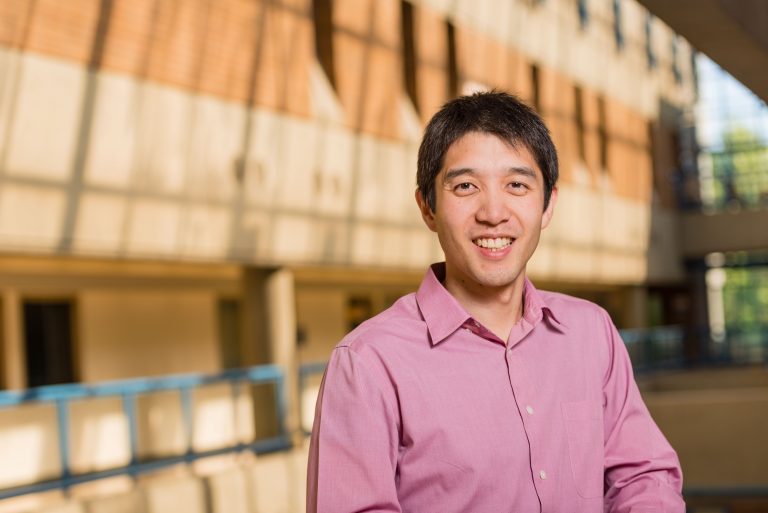

Benjamin Cheung
This month’s Thriving Faculty feature is a Q&A with Benjamin Cheung, a lecturer in the Department of Psychology.
Thriving Faculty is a monthly column that highlights UBC faculty who exemplify the integration of health and wellbeing into their classrooms, research, departments and communities. More
“I have found it helpful to meet with colleagues regularly to decompress, chat about how we are doing and support each other.”
Based on your experiences, please describe the relationship between student mental health and wellbeing and learning?
Student mental health and wellbeing play an immensely important role in learning. I am constantly amazed by, and so disheartened to learn about, the struggles that students deal with. I have heard so many stories from students in my brief four years as an educator, and they are constant reminders that behind the grades lie human stories. Depression, anxiety, sexual assault, suicidal ideation, overwhelmed by large classes, a large campus, a new country, Raincouver weather, [being] primary breadwinner in a household on a part-time salary, [having] family blocked out of the US because of Trump’s travel ban and preventing them from dealing with a family emergency. When students are worried about [any] combination of these, how can they perform and learn well?
Certainly many students are resilient and can persevere through their problems. They serve as great resources to help their peers, but many struggle with mental health which significantly interferes with their ability to learn. Without sufficient and appropriate resources, these students will continue to struggle.
Do you implement any strategies to support student mental health and wellbeing in the classroom/lab?
I focus on social connectedness and awareness promotion. Students talk about loneliness and isolation contributing significantly to their poor mental health. To improve social connectedness, I encourage my students to talk to each other. I get them to do partnered discussions or activities in class, and many students have established friendships through these interactions during the term.
Also, I have Bagels with Ben sessions every week with my students…I bring bagels and spread, students bring themselves, and we just chat with each other in a highly informal setting. Check out the latest pictures on Twitter using the hashtag #bagelswithben.
Last #bagelswithben session of 2016-2017 with @UBCPsych students! Great turnout, cleaned up all bagels. Hope to see more next year! pic.twitter.com/911Tqns0qF
— Benjamin Cheung (@UBCDrBenCh) June 20, 2017
Sometimes we cover serious topics like racism in Mexico, and sometimes we cover lighthearted topics like good Japanese restaurants. This allows students and me to engage with each other to create a healthy atmosphere. It is my hope that this make[s] the UBC community seem smaller and feel more familiar to students.
I also encourage discussions about mental health and remind students about the variety of resources that are available to them, including ones with little publicity. For instance, I get all of my students to watch a video about Early Alert to raise their awareness of how I intend to support students throughout the course.
I have also made it a habit to send a middle-of-the-term email to all of my students, reminding them of the numerous mental health support resources available to them. This is the period of time when students are especially stressed and mental health issues tend to peak. It is surprising to me how little people know about peer support networks on campus!
What strategies do you use in your own life that help you thrive as faculty?
Trying to maintain good mental health has become increasingly important to me as I gain more awareness of the consequences of my bad work habits from before. I now understand the need for time off, the importance of knowing how to say “no” to requests when I cannot take on more workload, and the immense role that my social circle plays in helping me maintain my wellbeing. This involves me saving time to indulge in some of my hobbies – gaming and hockey. I have also found it helpful to meet with colleagues regularly to decompress: chat about how we are all doing, share the burdens and stresses that we shoulder, and support each other. I would not be able to do it alone, so identifying my social networks (online or offline) is so important to helping me thrive.
Benjamin Cheung is a lecturer in the Department of Psychology. He teaches a variety of courses, including Research Methods (PSYC 217), Cultural Psychology (PSYC 307), and Social Psychology (PSYC 308A). He is also involved in a research project with the UBC Wellbeing office to try to enhance the mental wellbeing of psychology students. In addition to teaching and research, he is also the faculty advisor for the Psychology Students’ Association, the undergraduate student-run club in the department. When he isn’t busy planning his lectures or working on research projects, Benjamin spends his down time doing some gaming or playing hockey. He’s also trying to find a reason to go visit Japan – again.


